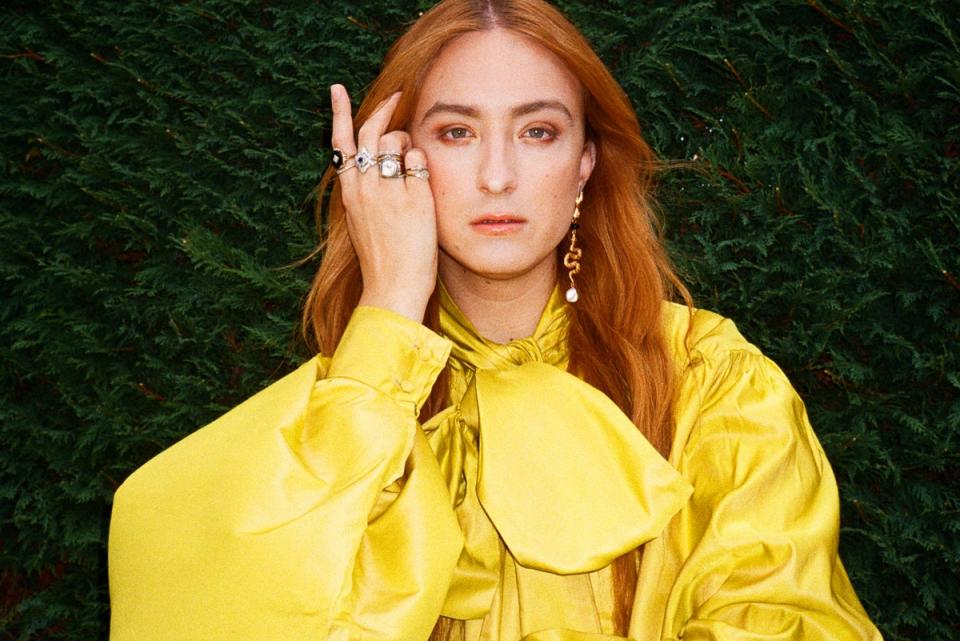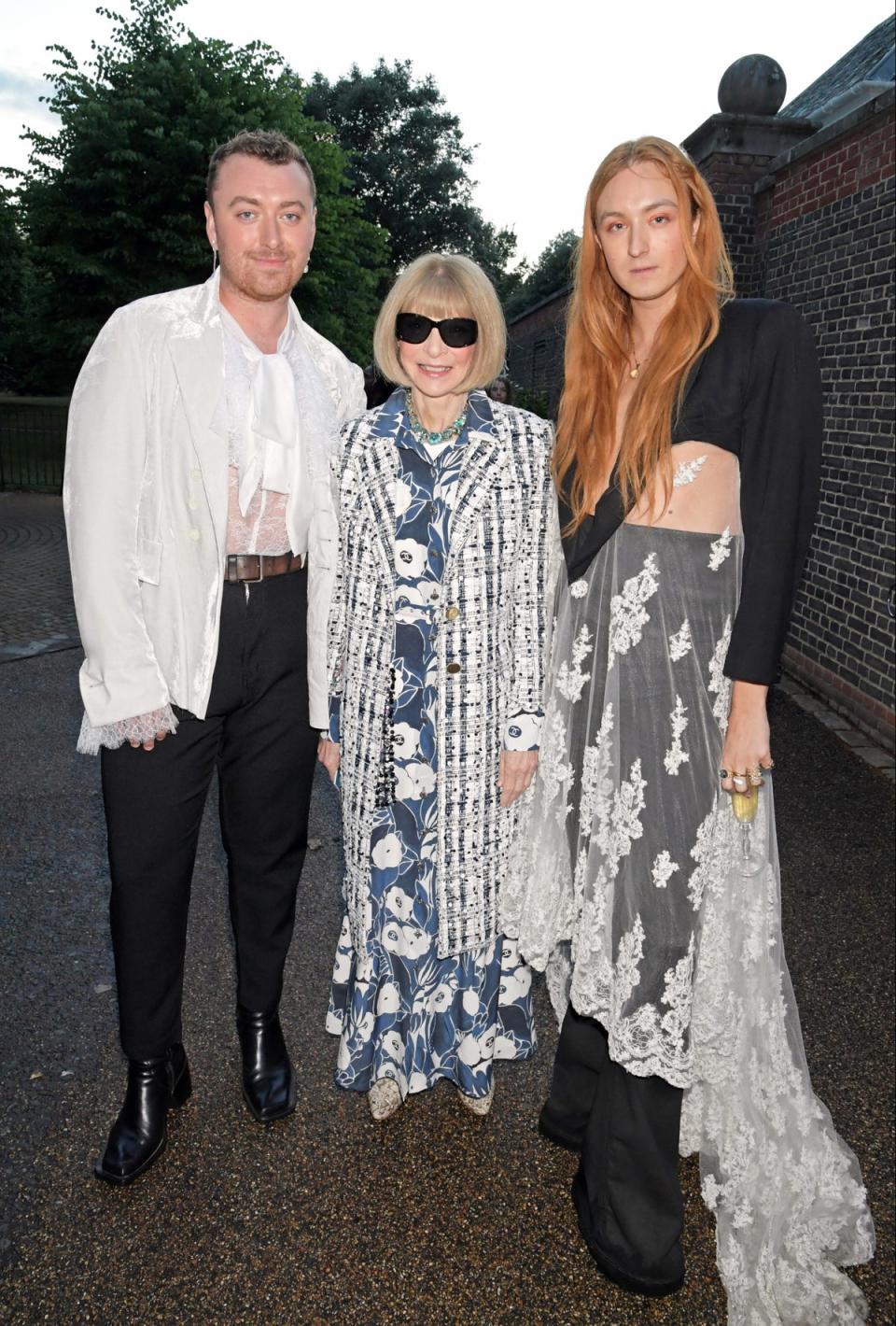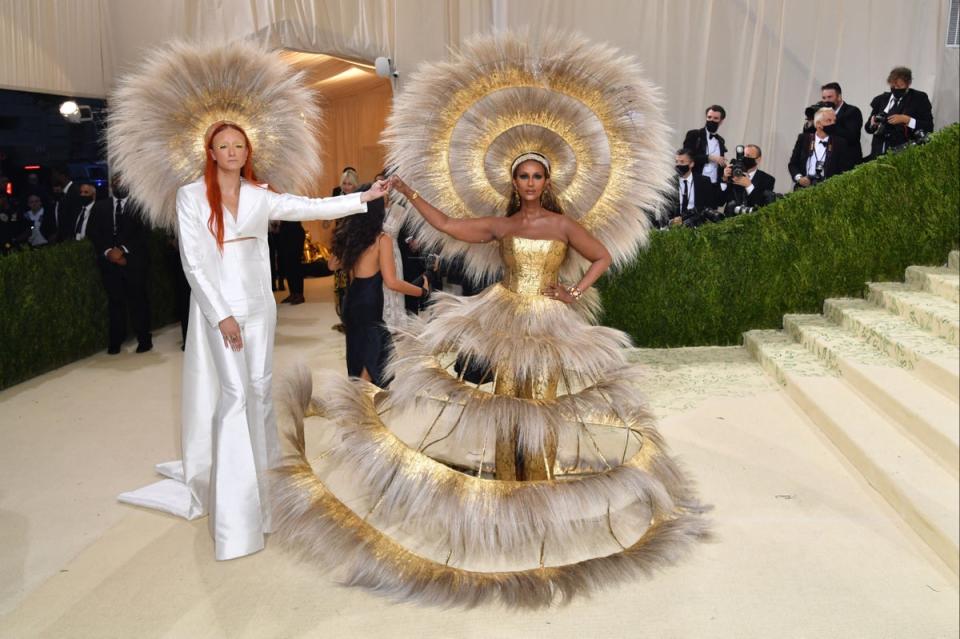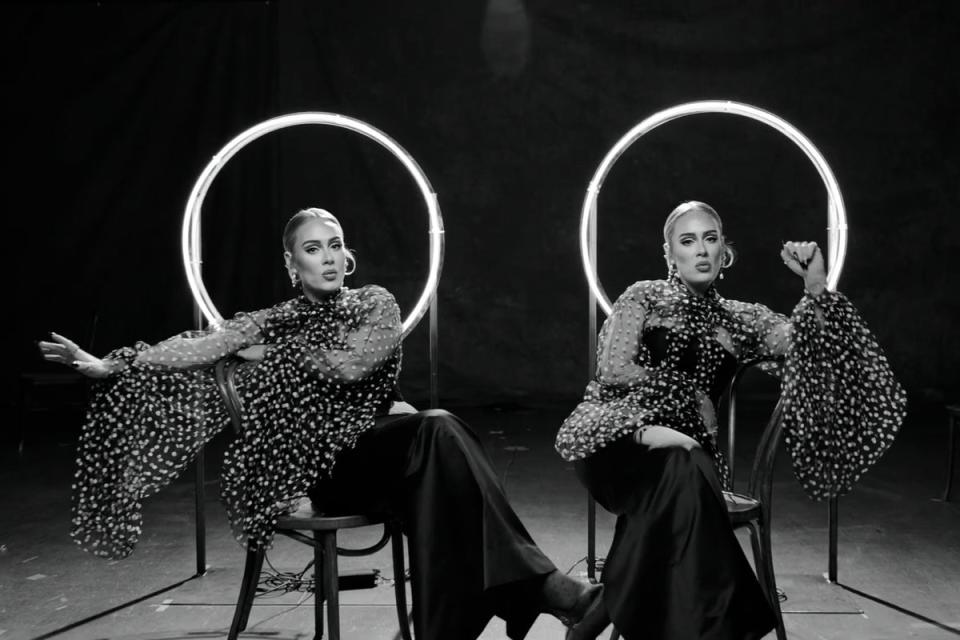Harris Reed: ‘I design for our gender-fluid world’

Harris Reed has dressed them all.
Beyoncé on the cover of British Vogue, Adele in her latest music video and if Harry Styles is wearing something noteworthy, it’s probably Harris Reed (the designer famously put Styles in a skirt on the cover of US Vogue). Lil Nas X, Emma Watson, Miley Cyrus, Emma Corrin, Selena Gomez, Sam Smith and Olly Alexander all adore him and supermodel Iman wore one of his theatrical creations to this year’s Met Gala.
These days, if a VIP is in pursuit of a headline-making moment, it’s 26-year-old Reed they call. It’s the sort of exposure that even the most established fashion houses have to work hard for - remarkably, though, Reed graduated from Central St Martins just two years ago. And this evening he will put on his first proper runway show at London Fashion Week.
When I meet with him there is just over a week to go before the show and he is reverberating with nervous energy. “I’ve been pinning sequins all day,” he says, talking 100 miles an hour in his signature ‘LA Valley Girl’ drawl. Reed is the child of Oscar-winning documentary maker Nick Reed (who is English) and former model Lynette Reed (who is American), and grew up in the States before moving to London seven years ago. Later, as we discuss privilege within the fashion industry (it’s hard to deny that so-called ‘nepotism babies’ like Lila Moss, Lily-Rose Depp, Kaia Gerber and Kendall Jenner are currently dominating runways) Reed will be forthright about what this charmed lineage has afforded him: “I will never deny the privilege that I had of being in the Hollywood world - and that helps with some of the people I’m dressing” but, he also points out that “this only got the door open - what keeps me in the room is myself. And so I might get an introduction to dress a celebrity but if I bring a shitty sketch or if I don’t over-deliver, they’re not going to do it.”

We’re at the Standard hotel near Kings Cross where Reed is designer-in-residence and has set up his studio. Until now he has only ever shown his collections through video and static presentations and although these were always high-glamour events, with performances from the likes of Sam Smith, this is the first time he’ll have models walking in a more traditional catwalk format. “It’s the most ambitious in terms of the scale of the show and of the pieces,” he says. “I’ve always struggled with traditional catwalks for my brand... A Harris Reed show is always quite intimate and while this will still be very intimate for a fashion show, we’re broadening the reach. And of course, models are walking. It’s an evolution of the storytelling.”
Of their performance at the Harris Reed show last season, Sam Smith tells me: “Performing at his show at London Fashion Week earlier this year was a beautiful experience, it was the kind of live intimacy I’d hadn’t experienced in some time. Not only is Harris one of the most exciting fashion visionaries to arrive out of the capital, but he himself is gorgeous inside and out and I love him.”
Preparations were going well, though of course, the sad news of the Queen’s death on Thursday September 8 - exactly a week before Reed’s show - threw the whole of London Fashion Week into question. On 9 September, big name brands Burberry and Raf Simons postponed their own ruway presentations. After much deliberation, the British Fashion Council decided that actually a scaled back version of fashion week could go ahead (with parties and public events cancelled, and no shows to be held on the day of the Queen’s funeral). The passing of Elizabeth II (who Reed “profoundly admired”) made him re-evaluate the entire show and collection. “I want more than ever for it to feel worthy in such an important moment. It’s been very challenging to navigate, and to make the right choices.” A few days later, Reed posted a rallying cry to his 601K Instagram followers urging the industry not to abandon LFW. It earned him widespread praise.
No doubt it’s been a challenging few days, but Reed is not easily dissuaded. He has, he says, an ‘intense self-assurance’ which comes from a childhood in which he was mercilessly rejected and bullied for being different. “I’m six foot four and a half now but I grew really tall very quickly and I had very camp mannerisms — I don’t use camp in a negative way — but I was very effeminate. I was like eight or nine and all the parents were like, ‘Oh, my God, Harris is gay, Harris is the gay kid,’ before I even understood what being homosexual meant. I was disinvited to sleepovers because the dads were like, ‘No, can’t have the gay kid there.’ Kids were pulled away from my classes. My mum and I moved back to California from Arizona, because the bullying was super bad. It was not fun.”

In the end, he says, it led to a kind of fearlessness. “I had to learn very quickly who I was. I had to get that elevator pitch down of like, ‘Hi, I’m Harris Reed, I’m queer, I have a message.’” Of his decision to champion gender fluidity in his designs, (which made his work a focus of last year’s Fashioning Masculinities exhibition at the V&A) he explains: “I know who I am and I know I have a purpose. You know, when you go through that shit, I don’t care if I get a bad show review — at least I’m saying something and making it fun.”
And what he’s saying is that everyone — regardless of gender — should be able to wear whatever they want. “Among Gen Z, people are like, ‘I’m wearing what I want to wear because I feel good in it’ and that’s literally what I’m trying to do and what I want to happen. Whether it’s pink socks or a huge feather pink coat, we’re moving somewhere positive. It’s this idea of we don’t give a fuck because we’re so comfortable with who we are — that would then, I hope, push to a greater acceptance of queerness. It means people can play with who they are — but it doesn’t mean people have to play with their identity — it just becomes the norm. It’s so straightforward really, but it needs to be done and I believe in it so much.” Essentially, he wants to create, he says, the safe space he didn’t have when he was a kid.

Reed has been on a voyage of self-exploration. Up until recently he went by the pronouns they/them, now he prefers he/him. Why? “It was coming to London and meeting trans and non binary individuals for the first time that super-opened my eyes and made me quickly realise that I’m more than just a gay man. I realised sexuality is fluid; that it’s a spectrum. I was 22 at the time and just figuring myself out.” Friends suggested the pronouns they/them might work — and they did. But at a “hyper-glamorised” photoshoot one day he found himself questioning the image he was putting out into the world. “I thought, ‘Oh my god, am I setting this archetype for an unrealistic standard of being gender fluid?’” He set about soul searching with the help of an “amazing therapist” and realised that “fluidity is fluid and if I wake up tomorrow and I want to be they/them again I can and if in ten years time I want to be she/her I can. So I went back to he/him but some people in my studio will say they/them, some will say she/her… it’s fluid, I tell them not to worry about it.” He was more worried his community would criticize him. “I was nervous people would shit on me because though I still fully believe I’m gender fluid, I just happen to have my pronouns as he/him, but it was so overwhelmingly embracing. I want to jump in different boxes, I am a fluid individual. My identity is something that is not fixed.”
I think ‘look how far we’ve come’ and then I walk out on on the street and someone says something homophobic
Reed is all too aware how divisive the issues of gender identity, trans rights and other so-called ‘woke’ topics are. “These days everyone’s voices can be heard — the good and, in my opinion, the bad and it creates a space where it gets aggressive. My boyfriend (Reed lives with his Chilean boyfriend Eitan Senerman in Notting Hill) commented when we first met on how I’d built a safe space. Like, I know which Tube not to take, I know when I’m not going to take the bus, I know what I’m gonna put in the extra money to take a car home... I’ve fully curated a space where I can feel okay enough to be able to scream as loudly within my work and be myself in my work and to not fall apart, because the voices are getting louder. If you have a fucking soul, doesn’t matter what you believe in, these people are human beings.” Many people who are anti-queer rights, he says, usually “combat it with a quick slur or an uneducated comment” with little knowledge or understanding of the issues, he gives the examples of trans athletes, especially in America. “We have to keep pushing and keep being ourselves.”

Is he seeing progress and more acceptance of gender fluid dressing? “In fashion I think ‘look how far we’ve come’ and then I walk out on the street and someone says something very homophobic. But I love, especially working with high profile people, that it’s starting to create a conversation.” He thinks what Harry Styles has done for gender fluidity is incredible. “By Harry taking a chance on me seven years ago as very queer, very vocal designer... he was so embracing of that. I think it’s positive when anyone is trying to further bring awareness to a community especially someone who’s probably one of the most watched people in the world. And no one knows him personally - even though I’ve known him for years, I’m also not super, super close to him. So it’s not for anyone to be able to judge who he is. Everyone likes to box someone in and be able to say, ‘he is this, he is that’ but actually, no, people are way more fluid. They’re way more multifaceted.”
Does he worry that gender fluid fashion has become just another trend? “My generation and the generation underneath have a good bullshit detector and it’s very clear when something feels genuine or disingenuous,” he says. “I normally try to bite my tongue if I feel like a huge company is doing something that feels like a blatant PR strategy but at least they’re starting a dialogue.”
Harry Styles took a chance on me seven years ago as a very queer, very vocal designer
Fashion is an industry so often accused of being tokenistic. Brands, Reed says, need to start putting their money where their mouth is. “If you’re going to show diversity, then who are you collaborating with? Who’s on your payroll? It’s why I stopped doing a lot of Pride projects because I was like ‘why isn’t this money going to GLAAD in America or Mermaids in the UK?’ If you’re going to be embracing a community, it’s also not only about giving back but also about bringing in people from that community and to make sure that you’re doing it right.”
Reed describes himself as a queer kid with a big dream. So what does that look like for him? “I have huge aspirations. Harris Reed in 30 years… I can’t tell you what it will look like, but I can tell you that it will have a mass effect within the world.”

For now, Harris Reed pieces are made-to-wear rather than ready-to-wear, meaning that it’s ok for Beyoncé (who he describes as having supreme control over her image while also being “a powerhouse, highly considered and very collaborative”) but the rest of us can only admire from afar. Will that change, could a Harris Reed store be on the cards one day? “I’m smiling because it’s something I’ve been thinking about a lot lately. I’m always fascinated about how I can get Harris Reed into people’s homes in unconventional ways. There’s no right way of what it could be. I have no desire to be anything less than great and anything less than influential and have impact but with a purpose. I don’t give a fuck about being famous, I don’t give a fuck about having a big house, but if I’m giving back, have a team and am making beautiful things then I’m doing it right.”
Watch the Harris Reed show live on @harris_reed

 Yahoo News
Yahoo News 